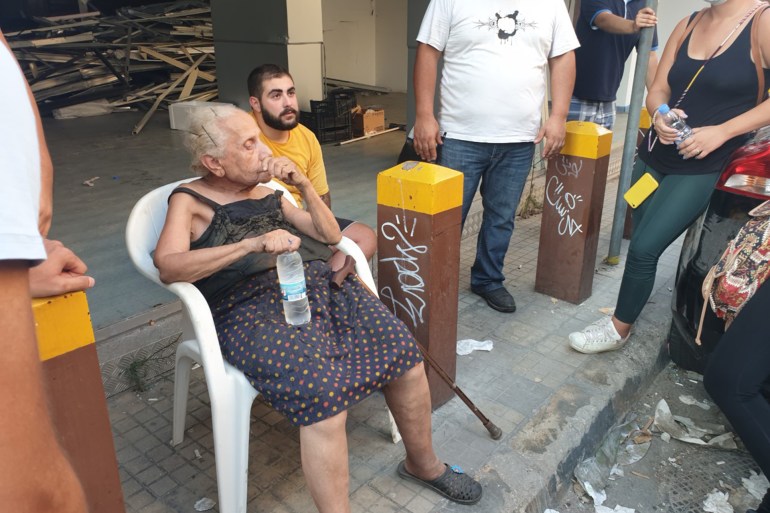Lebanese Laila Ghulam sits in front of the rubble of her house destroyed by the explosion of the Beirut port and says with emotion, "We have lost our lives in this great destruction, and the corrupt state will not compensate us for anything." Something alive. "
This lady lives in one of the old capital's buildings on Armenia Street near the capital's port. The house is over 150 years old.
"Four families live in this building and an apartment that we have turned into an office, and it is one of the most beautiful heritage buildings in Beirut. We never imagined that we would witness its destruction that destroyed our memories and reaped our lives," Leila said.
From the hours of the morning after the explosion, Laila continued with her family to sit in front of the rubble of their homes, from which they only took out some of their clothes from under the rubble, while they were preparing to live with their families outside the capital, until a solution was found for their destroyed homes.
Layla and her families are among the 250-300,000 people left without homes, because they have become uninhabitable, not to mention more than 155 dead, more than 6,000 wounded, 21 missing, massive destruction and billions of dollars in losses.
From Ashrafieh to Gemayzeh, Mar Mikhael and the Karantina area (the most affected areas), the scene appears to be the same in the scale of the destruction of hundreds of residential homes, after their balconies and windows collapsed, their ceilings collapsed, and some of them turned into a mass of accumulated rubble that wiped out their traces.
On a street in the Gemmayzeh district, the elderly nun Rose Selim (90 years) sits on a chair in the street, among dozens of young volunteers in the area.
Selim, who taught French for decades, was in her old house, in which she lives, alone during the explosion of the Beirut port, and lived moments of fear, "but I thank God for your intercession." She added, "Part of my house was completely destroyed, yet I sleep inside because I refuse to leave it no matter the cost."
And if residential homes were damaged, then the shops, restaurants and cafes of Beirut and its environs were destroyed.
In the commercial center of Beirut, and inside the streets of Gemmayzeh, Mar Mikhael and Ashrafieh, no institution, shop, or café remained unchanged. All turned into piles of rubble or completely shattered glass and contents.
Meters away from the main entrance in the Gemmayzeh district, Saeed Al Mulla, 34, stands in front of his destroyed little shop, which is a bar and restaurant.
He tells Al-Jazeera Net the moments he lived in last Tuesday's explosion, "I miraculously survived, and I was alone in the store and working on arranging it in preparation for receiving customers. I immediately rushed outside at a time when the shop was crashing, which led to my injury."
Said has no choice but to reform his place, having lost hope of state aid. "My material loss is estimated at 25 thousand dollars, and I am not able to leave the country because all my capital invested with my brother in this project, and what I fear most is that it will be destroyed again because there is no security in our country."
All the stores in Gemmayzeh and its surroundings, like a happy store. On Gulu Street, Nayla Saba, 42, sits inside her shop, which is a library of English books, with a café, nightclub and space for civic and cultural gatherings.
She told Al-Jazeera Net, "I cannot estimate the size of my loss, but it is very large at thousands of dollars, and all the contents of the store, its glass, air conditioners and tables have been destroyed, and I am trying to repair it at my own expense, after the insurance company refused to compensate us."
After the "catastrophe" of Beirut, tens of thousands of workers and employees were left without work. Saba had around 20 employees, all of whom are currently in difficult economic conditions.
"All my concerns lie in how to continue securing at least part of the employees' salaries, while the major crisis is that our money is still being held in banks, and the cost of repairs is very expensive as a result of the scarcity of dollars and the insufficient amount of materials that all Beirut needs after this destruction."

